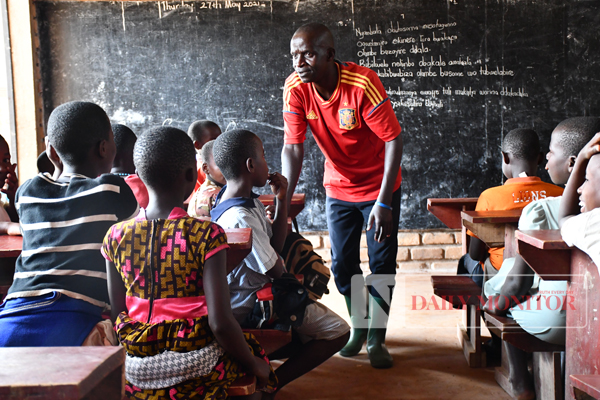Education as a humanitarian response

John Ssentamu interacts with learners in one of the classes at Good Shepherd Primary School in Katwadde, in Masaka. PHOTO | EDGAR R. BATTE
What you need to know:
- Mr Emmanuel Angoda says: We should not allow the current Covid-19 pandemic to further weaken our education system, and later present us with unacceptable inequality.
I find the recent comments by the former chairperson of Kamuli District, Ms Salaamu Musumba, that school going girls be given contraceptives since they no longer fear HIV/Aids both callous and unfortunate. If the former chairperson had/has school going daughters would she, as a parent, proudly buy a tin of contraceptives and place it in the house for them?
Children My son, who will be three years next month, is now of school-going age, but there is little I can do for him. My 13-year-old sister-in-law, who was supposed to be in P.5 this year, is also stuck at home. She is unsure of when she will return to school.
Since schools were closed in March 2020 as a measure to mitigate the spread of coronavirus, children have learned little. As young parents, we tried to print for them home-schooling resources and buy newspaper pull-outs. The reality is that there has been little learning because they only concentrate when one or both parents are at home. But little is better than nothing at all.
After a one-year-long stay at home, the girl resumed school on April 6, not in P.5, but P.4. She was very excited. For many children, school comes with many new things, from uniforms, school bag, and other fancy things. She studied for only eight weeks and got holidays on May 28. She was supposed to return on June 7 for a special term, before advancing to P.5 in August. Unfortunately, another lockdown was declared on June 6.
This second national lockdown will hit harder, and make many desperate for education and return to normal life. The Covid-19 situation has caused massive disruption in education. Dr. Rosarii Griffin, the director of Centre for Global Development through Education , and researcher at Office of the Vice President at University College Cork, Ireland, has long advanced the idea of regarding education as a humanitarian response.
Education as a Humanitarian Response (EHR), therefore, means full inclusion, including minority and marginalised groups, those temporarily excluded, as has been the case during the pandemic. HER, therefore, reinforces SDG 4; ensuring inclusive and equitable quality education and promote lifelong learning opportunities for all.
Looking at education from this angle, and considering that there has been massive, nationwide disruption of learning, means that it should merit extraordinary attention, and resources, together with urgency, just like other humanitarian disasters such as volcanic eruptions, flooding, or landslides. In this case, education should be seen as not only a social welfare service, but as a national response to the current disruption and, therefore, we should adopt emergency interventions. These should reinforce the view that education is a human right, and also a humanitarian response, in a situation like we have now.
We should not allow the current Covid-19 pandemic to further weaken our education system, and later present us with unacceptable inequality, both in terms of quality (rural vs urban) and gender. Every home that has school-going children should prioritise continuity in learning.
I know, right now, many parents must be having a lot going on in their minds. What if each family formulates its own home-learning framework, with support of teachers? Why don’t we take the idea of home-schooling to another level?
How about if the NGOs got involved, in the same way they respond to other humanitarian emergencies? For me, I have to keep my own “school” at home open, and the two children must continue learning. Because children are the future, whether there is an emergency (read pandemic) or not.
Emmanuel Angoda, Lira Town College



